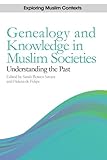Genealogy and Knowledge in Muslim Societies : Understanding the Past / Sarah Bowen Savant, Helena de Felipe.
Material type: TextSeries: Exploring Muslim Contexts : EMCPublisher: Edinburgh : Edinburgh University Press, [2022]Copyright date: ©2014Description: 1 online resource (164 p.)Content type:
TextSeries: Exploring Muslim Contexts : EMCPublisher: Edinburgh : Edinburgh University Press, [2022]Copyright date: ©2014Description: 1 online resource (164 p.)Content type: - 9780748644971
- 9780748644988
- 909.097671 23
- BP190.5.K55 G46 2014eb
- online - DeGruyter
- Issued also in print.
| Item type | Current library | Call number | URL | Status | Notes | Barcode | |
|---|---|---|---|---|---|---|---|
 eBook
eBook
|
Biblioteca "Angelicum" Pont. Univ. S.Tommaso d'Aquino Nuvola online | online - DeGruyter (Browse shelf(Opens below)) | Online access | Not for loan (Accesso limitato) | Accesso per gli utenti autorizzati / Access for authorized users | (dgr)9780748644988 |
Frontmatter -- Contents -- Figures and Tables -- Introduction -- Part One. The Generation of Genealogical Knowledge -- Chapter 1 Keeping the Prophet's Family Alive: Profile of a Genealogical Discipline -- Chapter 2 Motives and Techniques of Genealogical Forgery in Pre-modern Muslim Societies -- Chapter 3 The Genealogy of Power and the Power of Genealogy in Morocco: History, Imaginary and Politics -- Part Two. Empowering Political and Religious Elites -- Chapter 4 Berber Leadership and Genealogical Legitimacy: The Almoravid Case -- Chapter 5 Ways of Connecting with the Past: Genealogies in Nasrid Granada -- Chapter 6 Embarrassing Cousins: Genealogical Conundrums in the Central Sahara -- Part Three. Genealogy as a Source for Writing History -- Chapter 7 Was Marwan ibn al-Hakam the First "Real" Muslim? -- Chapter 8 Genealogy and Ethnogenesis in al-Mas'udi's Muruj al-dhahab -- Chapter 9 Genealogical Prestige and Marriage Strategy among the Ahl al-Bayt: The Case of the al-Sadr Family in Recent Times -- About the Contributors -- Index
restricted access online access with authorization star
http://purl.org/coar/access_right/c_16ec
Published in Association with the Institute for the Study of Muslim CivilisationsExplores the generation, preservation and manipulation of genealogical knowledgeFrom the Prophet's family tree to the present, ideas about kinship and descent have shaped communal and national identities in Muslim societies. So an understanding of genealogy is therefore vital to our understanding of Muslim societies, particularly with regard to the generation, preservation and manipulation of genealogical knowledge.These 9 case studies link genealogical knowledge to particular circumstances in which it was created, circulated and promoted. They stress the malleability of kinship and memory, and the interests this malleability serves.Key FeaturesDraws on primary sources from across the Middle East, the Maghreb, and Sub-Saharan Africa, ranging from works of the classical Arabic heritage to oral testimonies gained from fieldworkQuestions how genealogical knowledge has been generated, how it has empowered political and religious elites and how it has shaped understandings about the past - including those of modern scholarsExamines the authenticity, legitimacy and institutionalisation of genealogical knowledgeLooks at the bases for sectarian, tribal, ethnic and other identitiesExplores hierarchy and grounds for prestige and infamy
Issued also in print.
Mode of access: Internet via World Wide Web.
In English.
Description based on online resource; title from PDF title page (publisher's Web site, viewed 02. Mrz 2022)


